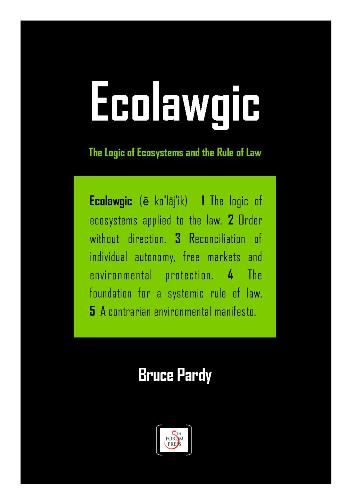
In his newly published book, Ecolawgic: The Logic of Ecosystems and the Rule of Law, Professor Bruce Pardy has a lofty ambition. He attempts to answer “the most difficult legal questions:” How can the law protect against arbitrary exercise of state power used to pursue self-interested ends, be they good or bad, and avoid imposing one group’s priorities over others? Are there standards that are natural, unquestionable, true and independent of human preference? Is there a non-arbitrary, uniform principle on which the law can be based?
Pardy’s answer to these questions is an original one: to take the logic of natural ecosystems and apply it to law and governance.
His main theory is that ecosystems provide insight about how the law should work. “Government policies and legal regimes try to dictate outcomes,” he says. “However, in reality, governments cannot control markets or ecosystems.”
But they certainly try, he explains. Modern environmental law authorizes officials to address problems one situation at a time: Should this industrial facility be permitted to pollute? Should that mining site be rehabilitated? How much of this hazardous substance is to be permitted in plastic bottles? How many wolves should live in the park?
The same, he continues, can be said in the economic realm, where governments subsidize manufacturing facilities and sports stadiums, bail out troubled banks and car manufacturers, create programs to counter poverty, spend public money to create jobs, provide funds to support specific towns or regions, maintain marketing boards for agricultural products, subsidize the development of alternative energy technologies, and in many other ways.
“These strategies,” he asserts, “are designed to provide governments with the ability to manage commercial activity and the economic behaviour of its citizens.”
Pardy argues that legal decisions should emanate from a system of governance, and that isolated, instrumentalist legal commands are not compatible with the operation of law as a system. Ad-hoc answers, on a case-by-case basis, are an affront to legal principles, he explains, much in the same way that “attempting to control the behaviour of butterflies is to the nature of an ecosystem.”
In his conclusion Pardy sets out his “Ecolawgic Manifesto,” a 10-point platform for ecosystems, markets and the rule of law that reconciles individual autonomy, free markets and environmental protection.
Despite the high ambitions for this book, it is an accessible one for new scholars and experienced academics alike. “I didn’t want to write an impenetrable academic tome,” he says. “My goal was to write a concise book that could be easily read, with a clean and bracing style.”
It is not surprising that Pardy has written such an innovative and inspired book. Recently described by Alberta Law Dean Paul Paton as “an iconoclast and one of Canada's leading thinkers on environmental law,” Pardy writes frequently on environmental governance, ecosystem management, water policy, climate change and environmental liability issues, and spent almost a decade as an adjudicator and mediator on Ontario’s Environmental Review Tribunal.
Learn more about Ecolawgic: The Logic of Ecosystems and the Rule of Law.